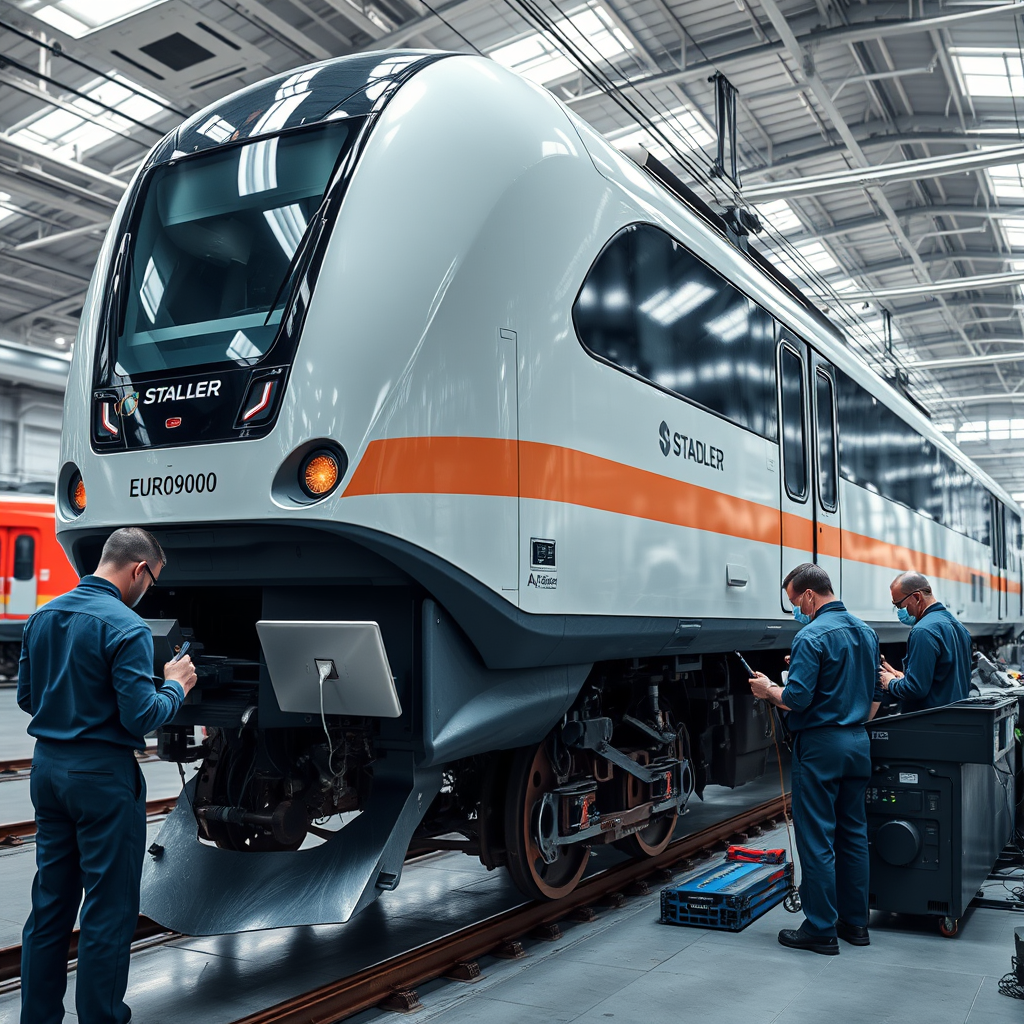Alpha Trains & Stadler: EURO9000 Maintenance Deal

This article examines the significant long-term maintenance agreement signed between Alpha Trains, a leading European rolling stock leasing company, and Stadler, a renowned rolling stock manufacturer. This agreement, focusing on a fleet of twelve EURO9000 locomotives, highlights the critical role of comprehensive maintenance contracts in ensuring the operational efficiency and longevity of modern railway assets. The agreement encompasses a wide range of maintenance services, from routine preventive checks to complex corrective repairs and heavy overhauls, underscoring the commitment to maintaining a high level of availability and performance for these locomotives throughout their operational lifespan. The strategic implications of such partnerships, the financial considerations involved, and the technological advancements enabling efficient maintenance practices will also be explored. The analysis will further consider the broader context of the railway industry’s increasing reliance on robust maintenance strategies to support the growing demand for reliable and efficient rail transport. Finally, the article will delve into the technological aspects of the EURO9000 locomotives and their impact on maintenance requirements.
A Strategic Partnership for Maintenance Excellence
The ten-year full-service maintenance agreement between Alpha Trains and Stadler represents a strategic alliance built on a long-standing relationship. Alpha Trains, known for its leasing of modern rolling stock, benefits from Stadler’s expertise in maintenance, ensuring optimal uptime for its EURO9000 locomotives. This collaborative approach minimizes operational risks for Alpha Trains, allowing them to focus on their core business of providing rolling stock to railway operators. Stadler, meanwhile, secures a substantial, long-term maintenance contract, guaranteeing a predictable revenue stream and reinforcing its position as a leading provider of both rolling stock and comprehensive maintenance services. This underscores the shift towards holistic service offerings within the rail industry, moving beyond simple manufacturing to encompass lifecycle management.
The EURO9000 Locomotive: A Technological Advance
The EURO9000 locomotives, at the heart of this agreement, are noteworthy for their hybrid multi-system capabilities. The locomotives are designed to accommodate three distinct propulsion systems: electric, diesel, and battery. Alpha Trains has opted for a configuration utilizing both electric and diesel power, demonstrating a commitment to flexible operation across diverse rail networks. This multi-system approach presents both opportunities and challenges regarding maintenance. The complexity of integrating and maintaining multiple propulsion systems necessitates a deep understanding of various technologies and necessitates specialized maintenance procedures to ensure optimal performance and reliability.
Maintenance Scope and Implications
The maintenance contract covers a comprehensive range of services, encompassing preventive maintenance, corrective maintenance, and heavy maintenance. Preventive maintenance, crucial for preventing failures, includes regular inspections and scheduled servicing. Corrective maintenance addresses unexpected breakdowns and repairs. Heavy maintenance, typically involving major overhauls, ensures the continued long-term reliability of the locomotives. The geographically dispersed nature of the operations, covering Germany and neighboring countries, highlights the importance of Stadler’s established service network and their capacity to deliver efficient and timely maintenance services across a wide area. This extensive coverage is vital for maintaining high availability of the locomotives and minimizing disruption to rail services.
Financial and Industry Context
The €15 million ($15.9 million) initial order for the locomotives, financed in part by the German Federal Ministry for Digital and Transport, demonstrates the importance of government investment in modernizing rail infrastructure. The long-term maintenance contract further adds to the overall investment, demonstrating the significant financial commitment involved in acquiring and maintaining modern locomotives. This financial investment showcases the importance of considering lifecycle costs when evaluating the economic viability of rail projects. This agreement also reflects a broader trend in the railway industry: a growing emphasis on outsourcing maintenance to specialized providers like Stadler. This allows operators to focus on their core business and leverage the expertise of manufacturers skilled in maintaining their own equipment.
Conclusion
The Alpha Trains and Stadler agreement showcases a significant development in the railway industry. The long-term, full-service maintenance contract for the EURO9000 locomotives exemplifies the increasing importance of comprehensive maintenance strategies in ensuring the operational success and economic viability of modern rail fleets. The agreement demonstrates a strategic partnership based on mutual benefits, highlighting the advantages of collaboration between rolling stock lessors and manufacturers. The focus on a hybrid multi-system locomotive, like the EURO9000, points to technological advancements shaping maintenance requirements and the need for specialized expertise. The financial investment and government support underscore the importance of modernizing rail infrastructure and the significance of lifecycle cost considerations. Finally, this strategic partnership serves as a model for future collaborations within the rail industry, highlighting the growing trend towards outsourcing maintenance to specialized manufacturers and the overall shift towards a more holistic approach to rolling stock lifecycle management. The success of this arrangement will be closely watched, setting a benchmark for future contracts and further emphasizing the critical role of proactive maintenance in maximizing the value and reliability of modern railway assets. The complexities inherent in maintaining advanced hybrid locomotives, like the EURO9000, underscore the need for ongoing innovation and collaboration within the rail sector to ensure reliable and efficient rail transportation into the future.






